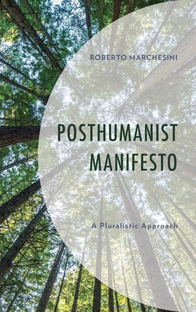***
The 30 theses that Roberto Marchesini presents in Posthumanist Manifesto. A Pluralistic Approach not only take us on a journey across space and time but also disclose future scenarios, guiding us towards unavoidable commitments if we want to continue inhabiting the Earth. Just over twenty years after the publication of his Post-human. Verso nuovi modelli di esistenza (2002), the philosopher looks retrospectively at what the past has produced in a realistic anticipation of what the future requires from us.
While reinforcing key concepts of posthumanism, such as the relational dimension of the human, the absurdity of ontological autarchy, and the hybrid nature of all cultural products, the book examines how an enduring anthropocentrism is the root cause of our ecological crises and how many of the prospective solutions we have come up with to solve the problem are merely palliative remedies – we are often grasping at straws to evade the core issue: the need to rethink our epistemological guidelines and to embrace an eco-ontology.
Marchesini’s critical targets include die-hard humanist attitudes, such as anthropoplasty, namely the tendency to view the world as merely a resource that gains value through human intervention; the illusory, yet surviving idea that technology is only a tool for human enhancement; and the persistence of concepts such as universality and purity, which deny that our nature is intrinsically relational and contaminating. Underscoring the separation between humans and non-human animals; viewing technology as an external device that enables humans to extend their control over the world while preserving their ‘human essence’, and the separation between disciplines such as the humanities and the hard sciences that continues to characterize pedagogy will only prolong and accelerate the ongoing crisis.
Technology in not an emancipating device, Marchesini posits – it actually increases our bonds with the world, bonds that are signs of fragility, not of strength. Yet, our fragility is also our resource for the future, stemming from our emotional richness. Emotions such as loving care, if nurtured, can help us restore a sentimental education which, rather than prescriptive is experiential; rather than telling us what we should do makes us feel that we must do something.
In the 30 theses of Posthumanist Manifesto therefore, the author also envisions vivid scenarios, where through a symbiontic relationship between humans, technology, and the rest of the living world, we confront the consequences of anthropocentrism and embrace our relational dimension, redefining what it means to be human. This groundbreaking work is not just a book; it's a powerful map that guides us toward a transformative future. Definitely a must.

 RSS Feed
RSS Feed
